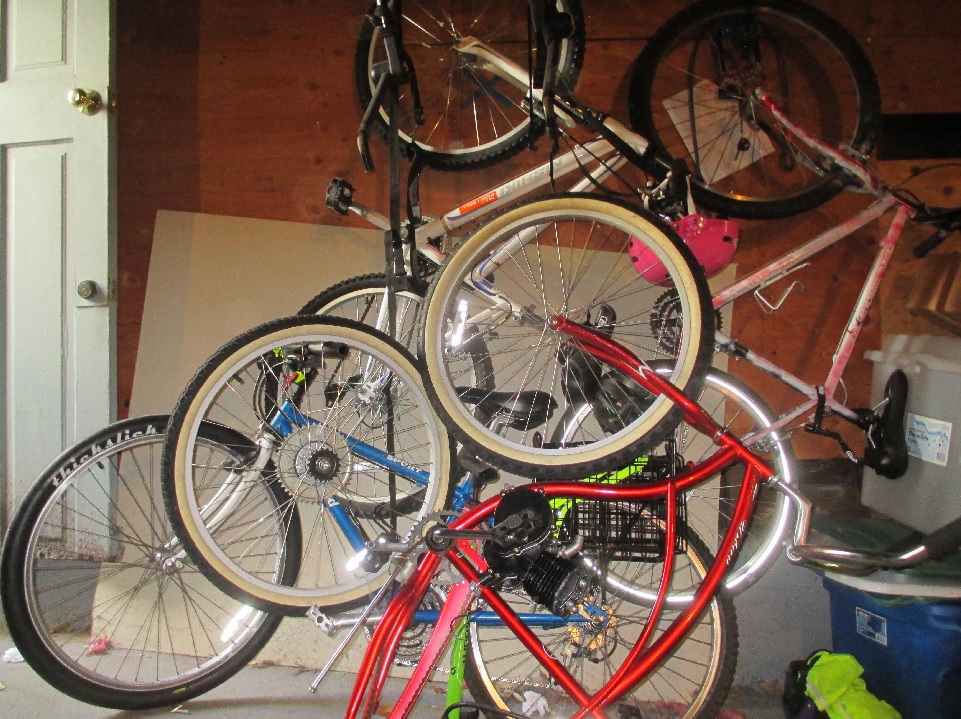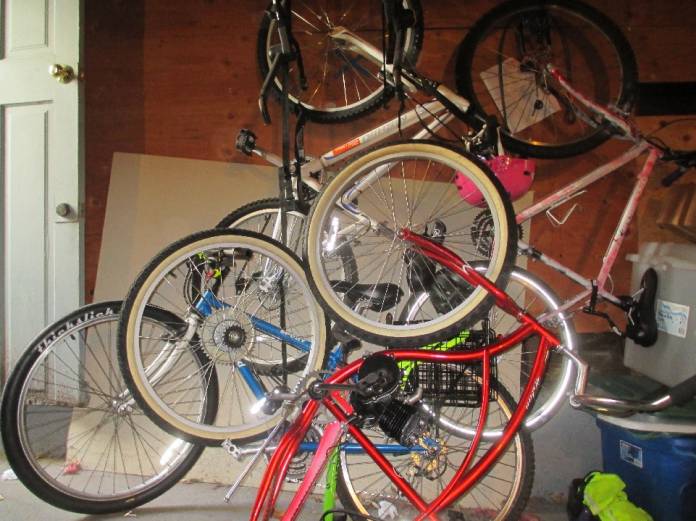San Francisco politicians have a history of attacking and scapegoating homeless people to advance their careers. Remember, Gavin Newsom (who is now campaigning for governor as a progressive) ran for mayor as the backer of measure that took welfare money away from the homeless. Now Sup. Jeff Sheehy has legislation that attacks homeless people who make a little money recycling and selling bicycle parts.
The bill has been around a while. It would criminalize the possession of five or more bicycles or bike parts by somebody living on the street. Sheehy, who is running for re-election in June, says his goal is to prevent bicycle thefts, which are a serious problem.

But the Coalition on Homelessness points out that not everyone who happens to lack a roof over their heads is a criminal.
The reality is that recycling bike parts is one of the few alternative economic venues for impoverished people to make a living. Destitute people receive donated bike parts, find parts in dumpsters and various locations, trade parts and are able to use their bike skills to repair bikes, build bikes and sell them for life sustaining income. They often don’t have means to sell their wares on places like Craigslist. Of course, some unhoused people engage in theft, as do some housed community members, but most of this economy is honest recycling. This legislation assumes that if you are unhoused and engaging in this element of the economy, you are presumed guilty of theft.
Similarly many avid housed and unhoused bicyclists own multiple bicycles that can be used for varying leisure and practical purposes. Avid cyclists collect accessories to decorate and improve their property. This ordinance allows the confiscation of property simply because the individual is both homeless (forced by destitution into “open air”), and has either five or more bicycle parts, five or more bicycles, three bikes with missing parts, or one frame with cut cables. We believe this ordinance will violate unhoused peoples’ property rights, simply because they are destitute.
I can tell you: My basement fits the definition of a chop shop in Sheehy’s bill. There are five or more bicycles in various states of repair, five or more bicycle parts, and three bikes with missing parts. None of them are stolen — but more important, I have a house.
The Sheehy bill would allow the Department of Public Works to decide, unilaterally, whether somebody has property that violates the law, and to confiscate the bicycles or parts.
Again, from COH:
California law presumes that a person who possesses an item is its rightful owner. This proposed legislation categorically authorizes the Department of Public Works to impound property without probable cause that bike items are stolen.
This legislation would result in the frequent confiscation of property from rightful owners, simply because they are destitute and therefore presumed to be thieves. In a truly Orwellian twist, the only way homeless rightful owners could get their property back is to either prove that they did not have multiple bike parts outdoors or to pay an impound fee, while housed people could prove ownership and have their impound fees waived. There is no means in this legislation for homeless people to prove ownership to avoid confiscation, or to get rightful property back for free.
The measure comes before the Land Use and Transportation Committee Monday/25. The hearing starts at 1:30pm.
The supes are set to hold a hearing Tuesday/26 on an issue that’s come up several times in the past but has never been fully resolved: Is a nine-year-old environmental study of the Mission, completed before the city was packed with Uber, Lyft, Chariot, and Google buses, still relevant enough to exempt a large market-rate housing project from further review?
Help us save local journalism!
Every tax-deductible donation helps us grow to cover the issues that mean the most to our community. Become a 48 Hills Hero and support the only daily progressive news source in the Bay Area.
The project at 1726 Mission involves a six-story structure with 40 market-rate condos above what is described as production, distribution, and repair space.
Our Mission No Eviction has called for a full environmental study, particularly to look at the impacts more high-end housing will have on the neighborhood.
But the city says that when it completed the Eastern Neighborhoods Plan Environmental Impact Report in 2008, it analyzed all the potential impacts from the thousands of new housing units the plan envisioned.
However, the appeal letter states,
The Department concedes that it has not properly analyzed cumulative impacts of 1924 new units built, entitled, or under review in a small eight block area on each side of Mission Street, from South Van Ness Avenue to Sixteenth Street.
Besides, as Sup. Aaron Peskin has pointed out in the past, the EIR for the Eastern Neighborhoods predicted about 2,000 new units, and more than 3,400 are now either constructed, approved, or under review.
“The underlying assumptions of the [plan] have, for the most part, proven to be incorrect,” the appeal states.
What this is really about is gentrification, and that argument that high-end housing winds up displacing existing vulnerable communities. In a remarkable statement responding to the appeal, the Planning Department denies that there is any truth to a claim that is pretty well proven by the track record of fancy projects in the Mission:
The Department disagrees with the appellant’s position that development under the Eastern Neighborhoods rezoning and area plans such as the 1726‐1730 Mission Street project are responsible for residential or commercial displacement. As shown in the attached analysis (Attachment A) prepared for the 2675 Folsom Street CEQA appeal, the appellant’s contention that the proposed project would cause or contribute to socioeconomic effects that would in turn result in significant impacts on the physical environment that were not previously identified in the Eastern Neighborhoods PEIR is contrary to the evidence. Based on the available data and expert opinion presented in the academic literature, it appears that the fundamental causes of gentrification and displacement in the Mission and elsewhere in San Francisco are likely related to broader economic and social trends, such as the mismatch between the supply and demand for housing at all levels, the strength of the regional economy, low unemployment, high wages, favorable climate, and a preference for urban lifestyles and shorter commutes.
That reads like a chapter from the Yimby Party textbook.
The hearing starts at 3pm.




